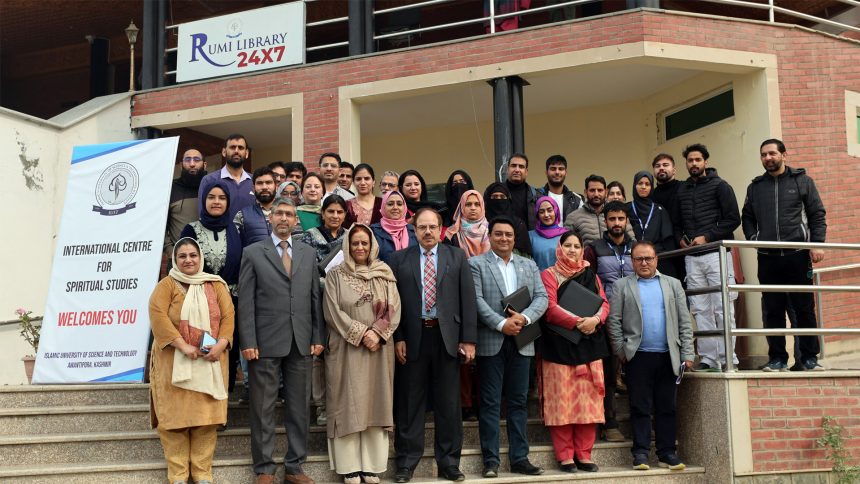
Ehsan Fazili/Srinagar
In a significant move to integrate the cultural and literary history of Kashmir into the mindset of students and their literary tastes, the Islamic University of Science and Technology (IUST), Awantipora, has set up the ‘Lal Ded Literary Society in the name of Kashmir’s first woman mystic poet of the 14th century whose legacy is claimed by the people of all faiths.
The Society was inaugurated by Vice Chancellor, of IUST, Prof Shakil Ahmad Romshoo, during the Literary Festival organized by the Editorial Committee, IUST, in association with the Jammu and Kashmir Academy of Art, Culture and Languages on the 19th Foundation Day of the University.
Prof Romshoo said that it was a significant milestone in IUST’s endeavour to preserve the culture, heritage, and literature of Kashmir. “IUST is always eager to foster clubs that ignite students’ passions.”
Sahitya Akademi Award awardee Kashmiri poet Prof Naseem Shafaie shared her experiences to make a point about cultures around the world celebrating their literature.
She asked the IUST administration to establish a ‘literary village’ - a space dedicated to celebrating the language and culture of Kashmir based on Lal Ded’s works.
"Lal Ded remains in the hearts of women and girls of Kashmir belonging to all faiths”, Prof Naseem Shafaie told Awaz The Voice on the sidelines of the event. “Lal Ded is living in the consciousness and sub-consciousness of our society”.
 Members of Lal Ded Society with VC Prof Romshoo and Prof Naseem Shafai
Members of Lal Ded Society with VC Prof Romshoo and Prof Naseem Shafai
Lal Ded also called Laleshwari, Lal Arifa or Lall Mouj (mother) is the first among the four Kashmiri women poets who set high standards of spiritual literature. Her poetry is folk lore and couplets which had survived through oral tradition are called Lal wakh (Sayings of Lala). The others are Habba Khatoon (16th century), Rupa Bhawani (17th century) and Arnimal 18th century.
Like Nund Rishi or Sheikh Noorudin Noorani, Lal Ded is a Sufi poet whose oral works have survived centuries. Kashmiri premier women's hospital associated with the Medical College is named lal Ded hHospitalin her name in Srinagar.
“She (Lal) occupies an important place in the 14th century Kashmir” when there have been little traces of literary history, Prof Shafaie said and added that Lal Ded’s emergence on the scene could have been nurtured by the prevailing faiths and beliefs and the literary atmosphere during that period. Lal was born in the beginning of a new era and she had reacted against the caste system, Naseem Shafaie commented. It was only in the 14th century that Islam had come to Kashmir.
An artist's work on Lal Ded
Comparing Kashmir’s Lal Ded for her poetic and literary contributions to Geoffery Chaucer, an English poet and author, called as “Father of English Literature” who died in 1400, Prof Naseem Shafie said that “we have Lal Ded known for her language and imagination in Kashmir poetry”. She pointed out that there was no clarity on the background and education of Lal Ded, though she continued to be claimed by people from different faiths. She had appeared at a time when Hindu and Buddhist mysticism were ruling the minds of people in Kashmir.
In the life of Lal Ded, there have been references to Sheikh Nooruddin Wali (1377-1438 AD), the founder of Sufism in Kashmir, and Mir Sayed Ali Hamadani (Shah-e-Hamadan), the Iranian saint who preached Islam and had twice visited Kashmir in the latter half of the 14th century.
The Islamic University of Science and Technology (IUST), Awantipora has already established the Habba Khatoon Centre for Kashmiri Language and Literature in recognition of the significance of the language, which is now declared one of the official languages of the UT of J&K.
Prof Naseem Shafai in her address said that the University has enough space to involve the men of letters, writers, poets, dramatists, etc to add to the scope of knowledge. She said that this “great space” should be open for all from within and outside the country to seek knowledge as Lal Ded cannot be erased from the cultural and literary history of Kashmir.
ALSO READ: Waris Khan is Rajgarh's first Good Samaritan for saving 7 lives
The literary fest featured a range of activities including poetry recitation, essay writing, Lal Vakh recitation, and debate competition. The proceedings of the event were conducted by Isma Hamid, and Heeba Din, proposed a vote of thanks. A short film capturing the essence of Lal Ded, produced by the Department of Journalism and Mass Communication, IUST, was screened during the event.
